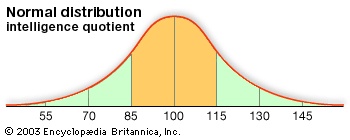IQ
psychology
 (from “intelligence quotient”), a number used to express the relative intelligence of a person. It is one of many intelligence tests (intelligence test).
(from “intelligence quotient”), a number used to express the relative intelligence of a person. It is one of many intelligence tests (intelligence test).IQ was originally computed by taking the ratio of mental age to chronological (physical) age and multiplying by 100. Thus, if a 10-year-old child had a mental age of 12 (that is, performed on the test at the level of an average 12-year-old), the child was assigned an IQ of 12/10 × 100, or 120. If the 10-year-old had a mental age of 8, the child's IQ would be 8/10 × 100, or 80. Based on this calculation, a score of 100—where the mental age equals the chronological age—would be average. Few tests continue to involve the computation of mental ages. See also Lewis Terman (Terman, Lewis Madison); Alfred Binet (Binet, Alfred).
- ulna
- Ulothrix
- Ulpian
- Ulrich
- Ulrich Boner
- Ulrich Brockdorff-Rantzau, Count von
- Ulrich, Count von Brockdorff-Rantzau
- Ulrich II von Cilli
- Ulrich Ochsenbein
- Ulrich, Saint
- Ulrich Salchow
- Ulrich von Hutten
- Ulrich von Wilamowitz-Moellendorff
- Ulrich Wehling
- Ulrich Wille
- Ulrika Eleonora
- Ulsan
- Ulster
- Ulster cycle
- Ulster Defence Association
- Ulster, Hugh de Lacy, earl of
- Ulster, Richard de Burgh, 2nd earl of
- Ulster Unionist Party
- Ulster Volunteer Force
- ultima Thule